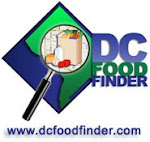By Kate Sims, Bread for the City volunteer. This is cross-posted from the DC Food For All.
What would a more food-just D.C. look like for you?
One community member recently shared her experience living on food assistance programs and her hopes for her family’s diet to expand beyond the pasta and beans offered by many local food pantries. To her, a more food-just D.C. includes vegetables and fruit in her grocery bags. 
As previously posted in Community Brainstorm: Building a Healthy, Hunger-Free DC, the food system impacts the environment, the economy and people, yet there is no centralized agency responsible for it; in DC, 13 different city agencies play a role in shaping our local food system. What is now being proposed is the formation of a food policy council, which has the potential to improve DC’s fragmented food system. Food policy councils in other cities and states engage with government policy, grassroots projects, businesses and food workers. They serve as forums for the discussion of food issues and coordination between the various sectors of the food system, and can influence government policies.
Visions for the ideal food-just system include expanding supermarkets across the city, specifying food vouchers for fruits and vegetables, and developing urban agriculture, especially in the expansion of community gardens, and to increase the presence of farm animals and fruit trees in the city.
Examples of initiatives that were presented as already working towards a more food-just D.C. included rooftop gardens, such as the newly established one a top Bread for the City, community and school gardens, gleaning programs, the donation of fresh produce to local shelters and food pantries, and “re-skilling” programs, such as the one offered by Ecolocity DC.
Also, specifically present in the Shaw neighborhood are the ONE DC wellness initiative and Common Good City Farm’s Green Tomorrows program, offering low-income adults or families fresh food from the farm and educational programs.
Overall, the community brainstorm confirmed the passion and determination among local advocates and community members alike to support greater organization and collaboration to create a more food-just D.C., one that better serves all D.C. residents. As one local advocate concluded, “We’ve got to get out of this beg mode and move to a power mode,” which I believe embodies the driving force behind the rapidly developing food justice movement here in D.C.
There are many ways to get involved, such as attending or hosting an upcoming discussion. For more information, contact Allison Burket at aburket@breadforthecity.org.
May 13, 2011
"Everyday…pasta and beans, pasta and beans. I would like to add some vegetables and fruit."
Subscribe to:
Post Comments (Atom)





No comments:
Post a Comment